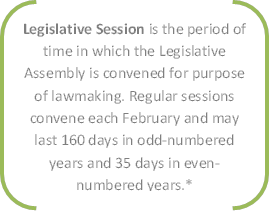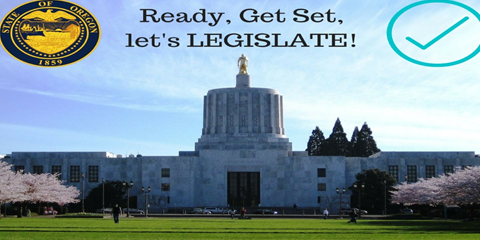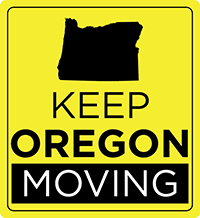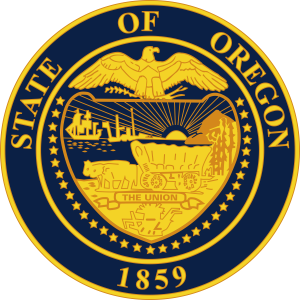By: Leah Fisher, Neighborhood Planning Program Manager
2017 legislative recap & preparation for 2018’s short legislative session in February!
It’s nearly that time of year again when our Oregon legislators come together to discuss, deliberate, and make decisions about policies and funding that impact livability from a state to a neighborhood level. If you missed our article last session, you can brush up on last year’s priorities and tips to participate in statewide legislative session here.
Recap of 2017
During the last session some big funding decisions were made in the area of transportation funding and pedestrian protection, while solutions to other livability issues like tenant protections were not. See a summary of bills below.
Transportation-related bills:
- A $5.3 billion Transportation Package (HB 2017) was approved, now called Keep Oregon Moving. In summary:
- This package raises taxes and fees to fund new infrastructure upgrades, fund rebates to encourage purchase and lease of electric cars and funds public transportation.1

- Increases the gas tax by four cents effective January 1, 2018, and provides additional two-cent increases effective January 1, 2020, 2022, and 2024, if the Oregon Transportation Commission meets certain conditions.
- Creates tiered vehicle registration rates, which require the owners of fuel-efficient cars to pay more.
- Sets up a 0.5 percent tax on the sale of new cars sold.
- Designates a 0.1 percent payroll tax to fund public transportation projects.
- Places a $15 fee on the sale of new bicycles.
- This package allows for tolling during rush hour on parts of I-5 and I-205. A committee has been directed to conduct a feasibility study on value pricing (i.e. tolling) which is anticipated to be completed by summer of 2018.
- Revenue from the package will be dedicated to improving road infrastructure – with a focus on reducing traffic congestion.
- The proposal would alleviate traffic congestion by adding lanes to I-5 through the Rose Quarter.
- It would also add lanes to portions of I-205 and replace the Abernathy Bridge in West Linn.
- The package also proposes adding lanes to Highway 217, in both directions.
- This package also addresses other modes of transportation, both investments in biking and walking infrastructure as well as Safe Routes to School (SRTS) funding and policy.
- Requires SRTS fund recipients to match funds at a minimum of 40 percent.
- Limits SRTS projects to a 1-mile walk zone around schools and 1/4-mile- around- schools limitation on infrastructure improvements.
- This package raises taxes and fees to fund new infrastructure upgrades, fund rebates to encourage purchase and lease of electric cars and funds public transportation.1
- Local Speed Limits (HB 2682) was approved, which authorizes City of Portland to designate speed limits five miles per hour lower than statutory speed (when a highway is located in the residential district and is not arterial highway). This bill allows the City of Portland to reduce speed limits on over 3,000 miles of residential streets — to 20 mph.2
- Speeding Enforcement (HB 2409) was approved, which gives cities the authority to issue citations to speeders identified by the use of red light cameras.3
- Distracted Driving (HB 2597) was approved, which expands the state’s definition of distracted driving by renaming the offense from “operating a motor vehicle while using mobile communication device” to “driving a motor vehicle while using mobile electronic device”. As of October 1, 2017, it is illegal to drive while holding or using an electronic device (e.g. cell phone, tablet, GPS, laptop).4
Housing and Tenant Protection bills:
There were no passages of housing protections, however, the Oregon legislature approved some revenue options and programs to support affordable housing and homeless services.
- For the biennium: $80 million in general obligation bonds to build more affordable housing; $25 million in lottery bonds to preserve existing affordable housing; $40 million in emergency rent assistance and shelter; $25 million a year in tax credits to help build or preserve affordable housing.
- Small investments for a land acquisition program for affordable housing, and legislation that allows churches to build affordable housing on their land and tools to help local jurisdictions understand what housing is being lost and what housing is needed for future planning.5
- There was no action taken on tenant protection bills, the attempted elimination of mortgage interest deduction program, restrictions on landlords for rent increases, or no cause evictions.
Other livability-related bills:
- For bills related to alcohol, marijuana, and tobacco go here for a summary from the Oregon Liquor Control Commission.
- For bills related to environmental and energy, such as cap and trade, air quality, and diesel emissions, go here for a summary from the Oregon State Chamber of Commerce.
- For bills related to protecting vulnerable Oregonians, visit Partners for a Hunger-Free Oregon’s summary here.
Preparation for 2018’s legislative session
For the upcoming 2018 session, which starts February 5th and end March 9th, according to an Advocacy 101 Panel held in Portland earlier this fall, it’s likely Oregonians will see housing and tenant protection bills come forward again along with other bills related to air quality, public health, healthcare, and more.6 To track proposed bills and watch sessions live, use Oregon Legislative Information System (OLIS). It may also be helpful to see if organizations you are members of our support are tracking bills relevant to and important to their mission. Many organizations track and provide updates, advocate, and even propose legislation before, during, and between sessions.
Lastly, it’s important to remember that bills passed at a state level will impact all neighborhoods in some way at some point – whether it’s reduced speed limits that make your walk to the corner store safer, tax revenue that funds infrastructure improvements, or tenant protections that allow your longtime neighbor to stay in their home. It’s important to stay tuned in and informed!
Sources:
[1]Oregon State Chamber of Commerce. (2017). 2017 Legislative Session Recap. Referenced from http://oregonchamber.org/wp-content/uploads/2017/07/2017-OSCC-Leg-Final-Report_Final.pdf
[2] Oregon State Legislature. (2017). Referenced from https://olis.leg.state.or.us/liz/2017R1/Measures/Overview/HB2682
[3] The Street Trust. (2017). Referenced from https://www.thestreettrust.org/2017/07/these-three-new-laws-will-save-lives-in-oregon/
[4] Oregon Department of Transportation.(2017).Distracted Driving Fact Sheet. Referenced from http://www.oregon.gov/ODOT/Safety/Documents/HB2597_Summary_for_Public.pdf
[5] Meyer Memorial Trust (2017). 2017 Oregon legislative session housing agenda recap. Referenced from https://mmt.org/news/2017-oregon-legislative-session-housing-agenda-recap
[6] 2017 Legislative Advocacy 101 Panel event. (10/30/2017). Reference https://www.portlandoregon.gov/oni/article/658777


